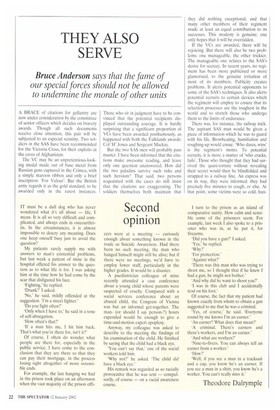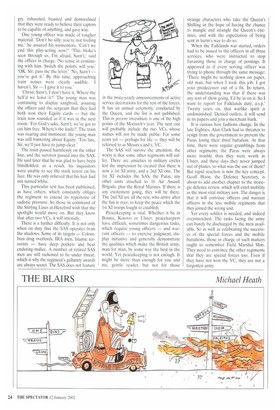THEY ALSO SERVE
Bruce Anderson says that the fame of
our special forces should not be allowed to undermine the morale of other units
A BRACE of citations for gallantry are now under consideration by the committee of senior officers which decides on bravery awards. Though all such documents receive close attention, this pair will be subjected to an especial scrutiny. Two soldiers in the SAS have been recommended for the Victoria Cross, for their exploits in the caves of Afghanistan.
The VC may be an unpretentious-looking medal made out of base metal from Russian guns captured in the Crimea, with a simple maroon ribbon and only a brief inscription: 'For Valour'. But the British army regards it as the gold standard, to be awarded only in the rarest instances. Those who sit in judgment have to be convinced that the potential recipients displayed outstanding courage. It is hardly surprising that a significant proportion of VCs have been awarded posthumously, as happened with both the Falklands awards: Col 'H' Jones and Sergeant Mackay.
But the two SAS men will probably pass muster. I have been informed that the citations make awesome reading, and leave only one question unanswered. How did the two paladins survive such risks and such heroism? That said. two persons acquainted with the cases do still insist that the citations are exaggerating. The soldiers themselves both maintain that they did nothing exceptional, and that many other members of their regiment made at least an equal contribution to its successes. This modesty is genuine; one only hopes that it will be overridden.
If the VCs are awarded, there will be rejoicing. But there will also be two problems: one manageable, the other trickier. The manageable one relates to the SAS's desire for secrecy. In recent years, no regiment has been more publicised or more glamorised, to the genuine irritation of most of its members. Publicity creates problems. It alerts potential opponents to some of the SAS's techniques. It also alerts potential recruits to certain devices which the regiment will employ to ensure that its selection processes are the toughest in the world and to stretch those who undergo them to the limits of endurance.
There was, for instance, the railway trick. The aspirant SAS man would be given a piece of information which he was to guard with his life. Browbeating, humiliation and roughing-up would ensue. 'Who dares, wins' is the regiment's motto. To potential recruits, it is more a matter of 'who cracks, fails'. Those who thought that they had survived the quasi-torture without revealing their secret would then be blindfolded and strapped to a railway line. An express was on its way, they were informed: they had precisely five minutes to cough, or else. At that point, some victims were so cold, hun gry, exhausted, beasted and demoralised that they were ready to believe their captors to be capable of anything, and gave way.
One young officer was made of tougher material. 'Don't be silly: you're not fooling me,' he assured his tormentors. 'Can't we end this play-acting now?' 'This bloke's seen through us, I'm afraid, Sarn't,' said the officer in charge. `No sense in continuing with him. Switch the points, will you.' 'OK. Sir: pass me the lever.' 'No, Sarn't — you've got it.' By this time, approaching train noises were clearly audible. 'I haven't, Sir — I gave it to you.'
'Christ. Sarn't, I don't have it. Where the hell'd we leave it?' The young man was continuing to display sangfroid, assuring the officer and the sergeant that they had both won their Equity cards — but the train now sounded as if it was in the next room. 'For God's sake, Sarn't, we've got to cut him free. Where's the knife?' The train was roaring and imminent: the young man was still bantering about Equity. 'Too late, Sir, we'll just have to jump clear.'
The train passed harmlessly on the other line, and the survivor passed into the SAS. He said later that he was glad to have been blindfolded; as a result, his inquisitors were unable to see the stark terror on his face. He was only relieved that his hair had not turned white.
This particular test has been publicised, as have others, which constantly obliges the regiment to extend its repertoire of sadistic pressure. So those in command of the Stirling Lines at Hereford wish that the spotlight would move on. But they know that after two VCs, it will intensify.
There is a further difficulty. It is not only when on duty that the SAS operates from the shadows. Some of its targets — Colombian drug overlords. IRA men, Islamic terrorists — have deep pockets and bear enduring malice. A number of retired SAS men are still reckoned to be under threat, which is why the regiment's gallantry awards are always secret. The SAS does not feature in the twice-yearly announcements of active service decorations for the rest of the forces. It has an annual ceremony, conducted by the Queen, and the list is not published. This in pectore investiture is one of the high points of the Monarch's year. The next one will probably include the two VCs, whose names will not be made public. For some years yet — perhaps for life — they will be referred to as Messrs x and y, VC.
The SAS will survive the attention; the worry is that some other regiments will suffer. There are anxieties in military circles lest the impression be created that there is now a 1st XI army, and a 2nd XI one. The 1st XI includes the SAS. the Paras, any other units attached to 16 Air Assault Brigade, plus the Royal Marines. If there is any excitement going, they will be there. The 2nd XI are all the rest, who arrive after the fun is over, to keep the peace which the 1st XI troops fought to establish.
Peacekeeping is vital. Whether it be in Bosnia, Kosovo or Ulster, peacekeepers have difficult, sometimes dangerous tasks, which require young officers — and warrant officers — to exercise judgment, display initiative and generally demonstrate the qualities which make the British army, man for man, by some way the best in the world. Yet peacekeeping is not enough. It might be more than enough for you and me. gentle reader, but not for those strange characters who take the Queen's Shilling in the hope of having the chance to mangle and strangle the Queen's enemies, and with the expectation of being sent in harm's way to do so.
When the Falklands war started, orders had to be issued to the officers in all three services, who were instructed to stop harassing those in charge of postings. It appeared as if every serving officer was trying to phone through the same message: 'There might be nothing down on paper, old man, but when I took this job, I got your predecessor out of a fix. In return, the understanding was that if there was any sort of show going, I'd be in on it. So I want to report for Falklands duty, a.s.p.' Twenty years on, that warlike spirit is undiminished. Denied outlets, it will send in its papers and join a merchant bank.
It is curious how fashions change. In the late Eighties, Alan Clark had to threaten to resign from the government to prevent the Paras losing their third battalion. At that time, there were regular grumblings from other regiments; the Paras were always more trouble than they were worth in Ulster, and these days they never jumped out of planes, so what was the use of them? But rapid reaction is now the key concept. Geoff Hoon, the Defence Secretary, is about to add another chapter to the strategic defence review, which will extol mobility as the most vital military arm. The danger is that it will convince officers and warrant officers in the less mobile regiments that they joined the wrong unit.
Yet every soldier is needed, and indeed overstretched. The tasks facing the army can barely be discharged by the men available. So as well as celebrating the successes of the special forces and the mobile battalions, those in charge of such matters ought to remember Field Marshal Slim. They need to convince the other regiments that they are special forces too. Even if they have not won the VC, they are not a forgotten army.



























































 Previous page
Previous page